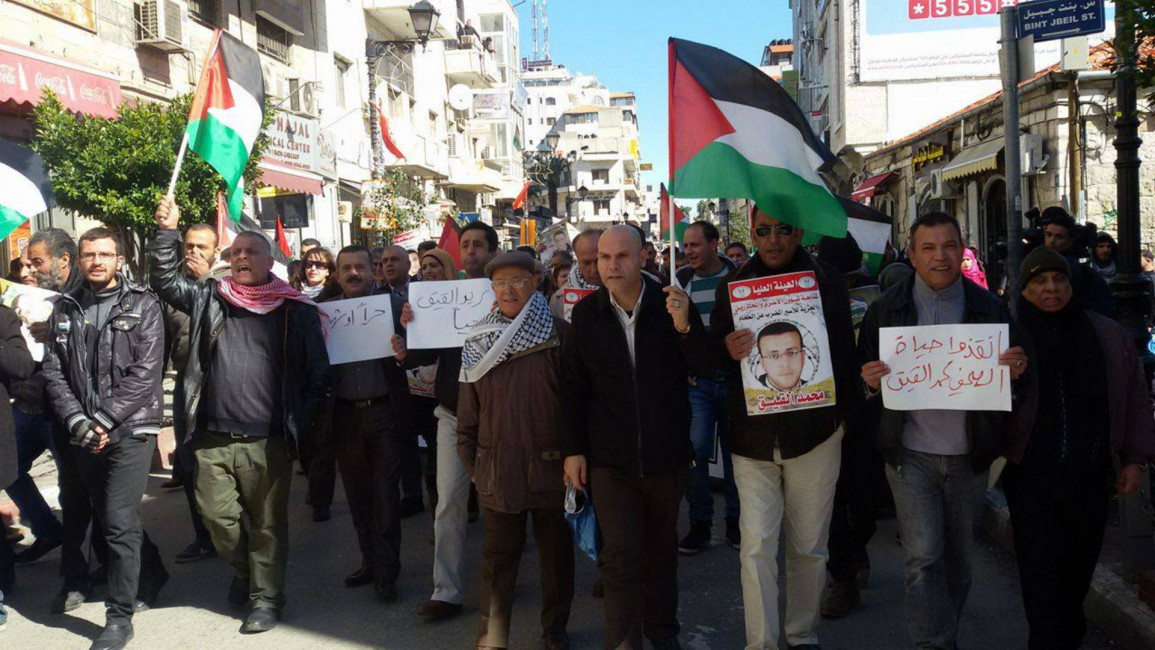'Suspending detention is murder': Family of Palestinian hunger-striker
'Suspending detention is murder': Family of Palestinian hunger-striker
The family of hunger-striking Palestinian journalist Mohammad al-Qiq called the Israeli Supreme Court's decision to suspend his detention an 'execution under the pretext of medical treatment.'
3 min read
Many have called for the release of the Palestinian journalist [al-Araby al-Jadeed]
Israel's Supreme Court on Thursday suspended the detention without trial of a Palestinian journalist who has been on hunger strike for more than two months, but he cannot leave hospital without permission.
Al-Qiq's family called the suspension of his detention a murder and an execution under the pretext of medical treatment and a way to dodge responsibility for anything that may happen to him.
Mohammad al-Qiq, 33, was said to be on hunger strike for 72 days to protest being held under Israel's controversial administrative detention law, which allows the state to hold suspects for renewable six-month periods without trial.
The court said the order was being suspended due to his poor health. His family will be allowed to visit him in hospital.
The family refused to visit Al-Qiq in Israeli occupation hospitals, underscoring that Mohammad's wish was to be treated in a Palestinian hospital.
Qiq's lawyer said the journalist had earlier pledged to refuse any order that "doesn't guarantee his freedom".
"I'm going to visit him now to know his decision," said Jawad Boulus.
The International Committee of the Red Cross said last week that Qiq's life was in danger.
Following a visit to Israeli HaEmek hospital in Afula, Jawad Boulos, Qiq's lawyer, described his client's health state as gravely deteriorating.
"Qiq has lost his ability to speak and hear, and he suffers from severe pain in his muscles," Boulos said.
Qiq, a father of two and a correspondent for Saudi Arabia's Almajd TV network, was arrested on 21 November at his home in the West Bank city of Ramallah.
He has been refusing food since 25 November in protest against the "torture and ill treatment that he was subjected to during interrogation", according to Addameer, a Palestinian rights organisation.
Israel's Supreme Court previously refused to order his release, although it said it would follow his health on a daily basis.
Al-Qiq's family feared that Israel might use a controversial Israeli law passed in July that allows the force-feeding of prisoners in certain circumstances.
Over the weekend, human rights group Amnesty International called on Israeli authorities to immediately cease all non-consensual medical treatment and other punitive measures against Qiq.
The London-based group said that authorities had undertaken a number of measures aimed at pressuring him to end the hunger strike, some of which violated the prohibition of torture and other ill-treatment.
"Mohammad has forcibly received intravenous drugs which we fear prelude force-feeding attempts," Mohammad's wife Faihaa Shalash told The New Arab.
Shin Bet, the Israeli security service, said Qiq was arrested for "terror activity" as part of the Islamist group Hamas, which controls the Gaza Strip.
Qiq was jailed for a month in 2003 and then for 13 months in 2004 for alleged affiliations with Hamas.
In 2008, he was sentenced to 16 months on charges linked to his activities on the student council at the West Bank's Birzeit University.
Agencies contributed to this report
Al-Qiq's family called the suspension of his detention a murder and an execution under the pretext of medical treatment and a way to dodge responsibility for anything that may happen to him.
Mohammad al-Qiq, 33, was said to be on hunger strike for 72 days to protest being held under Israel's controversial administrative detention law, which allows the state to hold suspects for renewable six-month periods without trial.
The court said the order was being suspended due to his poor health. His family will be allowed to visit him in hospital.
The family refused to visit Al-Qiq in Israeli occupation hospitals, underscoring that Mohammad's wish was to be treated in a Palestinian hospital.
Qiq's lawyer said the journalist had earlier pledged to refuse any order that "doesn't guarantee his freedom".
"I'm going to visit him now to know his decision," said Jawad Boulus.
The International Committee of the Red Cross said last week that Qiq's life was in danger.
Following a visit to Israeli HaEmek hospital in Afula, Jawad Boulos, Qiq's lawyer, described his client's health state as gravely deteriorating.
 |
Qiq has lost his ability to speak and hear, and he suffers from severe pain in his muscles - Qiq's lawyer |
 |
Qiq, a father of two and a correspondent for Saudi Arabia's Almajd TV network, was arrested on 21 November at his home in the West Bank city of Ramallah.
He has been refusing food since 25 November in protest against the "torture and ill treatment that he was subjected to during interrogation", according to Addameer, a Palestinian rights organisation.
Israel's Supreme Court previously refused to order his release, although it said it would follow his health on a daily basis.
Al-Qiq's family feared that Israel might use a controversial Israeli law passed in July that allows the force-feeding of prisoners in certain circumstances.
Over the weekend, human rights group Amnesty International called on Israeli authorities to immediately cease all non-consensual medical treatment and other punitive measures against Qiq.
 |
Mohammad has forcibly received intravenous drugs which we fear prelude force-feeding attempts - Qiq's wife |
 |
"Mohammad has forcibly received intravenous drugs which we fear prelude force-feeding attempts," Mohammad's wife Faihaa Shalash told The New Arab.
Shin Bet, the Israeli security service, said Qiq was arrested for "terror activity" as part of the Islamist group Hamas, which controls the Gaza Strip.
Qiq was jailed for a month in 2003 and then for 13 months in 2004 for alleged affiliations with Hamas.
In 2008, he was sentenced to 16 months on charges linked to his activities on the student council at the West Bank's Birzeit University.
Agencies contributed to this report



